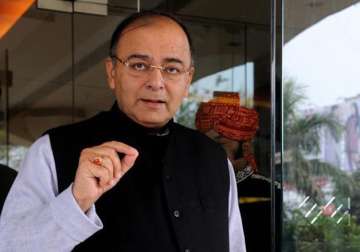Govt being criticised for being too fast: Arun Jaitley
New Delhi: Virtually rebutting criticism by leading banker Deepak Parekh, Finance Minister Arun Jaitley today said the government is being criticised for rather being “too fast”.While Jaitley parried a question on Parekh's criticism yesterday that

New Delhi: Virtually rebutting criticism by leading banker Deepak Parekh, Finance Minister Arun Jaitley today said the government is being criticised for rather being “too fast”.
While Jaitley parried a question on Parekh's criticism yesterday that impatience has begun creeping in among businessmen as nothing has changed on ground in the first nine months of the Narendra Modi government, Commerce Minister Nirmala Sitharaman said: “I think the Finance Minister has spoken in a way about it.”
Launching the e-biz portal of the government, Jaitley said: “We have to actually see what are the various steps that we have taken and the community of investors both within and outside the country watch us.
“In the first instance, what is the credibility of this government. What is the decisiveness of our decision making process? What is the process by which government treats business? And it's an irony that after having seen lethargic governments, you today have a government which is criticised for being too fast.”
He made no direct reference to Parekh's comments but said that government has chose the ordinance route to expedite legislative changes to promote businesses.
“Why you bring ordinances, you should wait till the cows come home and everybody can be settled and decisions can be taken. So in fact one great criticism which has come is you should have waited and not acted fast,” he said.
Separately Power and Coal Minister Piyush Goyal also dismissed the industrialist's criticism saying share prices of Parekh's own group companies HDFC and HDFC Bank have gone up and the stock market only reflects improvement in economy. He further said he doesn't know if the banker had any personal reason for making such comments.
The Finance Minister himself criticised the way things were being run during the previous UPA regime.
“There are lots of self goals over the last few years that have been scored. In a country where you are not certain whether you will get land to set up business, you are not certain as to the stability and predictability of taxation is going to be, and I think we scored too many self goals in the past.
“India cannot be divided into two different schools of thought. There is a stance for the businesses, there is a stance for the poor people,” Jaitley said. The Minister, who is scheduled to present the budget on February 28, promised to make it easier to do business, expedite environmental clearances for projects and encourage domestic as well as overseas investments.
He said the best way to deal with the problem of poverty is encouraging business and industry as they bring in higher revenues and increase the ability of the government to deal with the problems.
At a time when the competing economies are facing challenges, Jaitley said, “the history has provided us with a rare opportunity where the world is looking at us with investment and the present government is determined, having eased many processes, to go on that path.
“The starting point of growth of Indian economy, the starting point of job creation is going to be investment into the country—investment both from within and investments which is in an additionality of resource coming from outside.”
The Minister was also critical of the “ultra aggressive” tax policy of the UPA government saying that it had driven away the global investors and also promoted the domestic industry to look for investment opportunities elsewhere.
On environmental clearances, Jaitley said “our government took a decision that environmental permissions where they have to be given while balancing it with ecological consideration will have to be expedited”.
The ideal government is one where those wanting to do businesses don't have to visit the corridors of power for regulatory clearances, he said.
The Minister also defended changes in the land acquisition laws saying that setting up of industrial corridors would generate jobs and eventually enhance the value of rural land benefit the farmers.